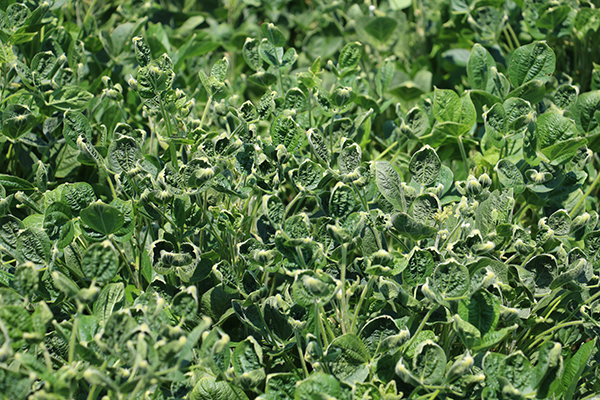
26 Dec CRACKS MAY BE SHOWING IN DICAMBA CONTROL OF PIGWEED
Published by Successful Farming
By Bill Spiegel
TENNESSEE SPECIALIST CAUTIONS ON OVERUSE OF DICAMBA-TOLERANT CROPS.
Dicamba-resistant pigweeds already?
Believe it, says Larry Steckel, weed specialist at the University of Tennessee. Just north of Memphis, Steckel identified a single pigweed plant that emerged unscathed from an application of 22 ounces of XtendiMax and a quart of Roundup…while pigweeds surrounding this single plant were smoked.
Steckel says more research is needed to determine whether this one plant is truly resistant, or if there were other factors influencing its survival. But it’s a wake-up call signaling – that like all weed control systems – the effectiveness of dicamba-tolerant crops won’t last forever.
Memphis seems to be ground zero for herbicide-resistant pigweed species, Steckel told growers at the University of Missouri Crop Management Conference November 18 in Columbia. The nation’s first glyphosate-resistant pigweeds, Treflan-resistant and ALS herbicide-resistant pigweeds all were discovered within 30 miles of Memphis. Quickly, herbicide-resistance spread to other states.
“We can see resistance developing to dicamba very quickly. In fact, I don’t know if we’re not already starting to see it,” the weed scientist says.
HISTORY REPEATING ITSELF
For the first time in years, fields of soybeans and cotton throughout the Mid-South are free of palmer amaranth, due in large part to widespread adoption of crops tolerant to dicamba herbicides (Xtendimax, Engenia, and Fexipan). Between Xtend soybeans and Enlist cotton, fields are “….as clean as they’ve been in decades,” Steckel says. Fields are so free of weeds that it reminds Steckel of the early years of Roundup Ready crops, when weed control was as easy as spraying glyphosate over the top of growing crops.
That was the late 1990s. Before long, however, widespread adoption of Roundup Ready crops led to resistance.
Fast forward to 2018. In Tennessee, 95% of the soybean acres were planted to Xtend soybeans. That much dicamba, on that many acres, will lead to dicamba-resistant weeds, Steckel says.
“I worry we’re not managing dicamba out of the gate, and I don’t know how long a shelf life it will have, given the level of control we’ve had the past year.”
Two decades ago, the Roundup Ready crop system appeared to be a silver bullet for farmers, with quick and easy weed control. That easy solution was short-lived.
“It only took 12 applications of Roundup until you saw resistance,” Steckel says. “That’s what I worry about going forward.”
AN ALTERNATIVE TO DICAMBA
Too much reliance on dicamba-tolerant crops will hasten its demise. Steckel urges farmers to adopt additional management strategies to keep dicamba effective for as long as possible.
Applying other preemerge herbicides with residual activity that are effective on pigweeds is essential.
“We have to do other things. It’s easy for me to say but hard to do,” he says.
Yet, planting cover crops prior to soybeans is one strategy that seems to be working.
Steckel says growers planting a wheat/vetch blend in the fall prior to soybean planting are finding excellent pigweed suppression, as long as a residual herbicide (Dual, Prefix, Warrant, Zidua, and Zidua plus Reflex all were tested by Steckel and his crew) is added to the tank when the cover crops are burned down with dicamba and glyphosate.
“It didn’t really matter which herbicide we used, as long as we used one. The cover crop helped, particularly if we burned down 14 days after planting,” he says. “The later you can let that cover crop grow the more traction you can get out of the weed control part of it.”
He cautions that leaving the residual out of the equation compromises the effectiveness of the cover crop to suppress weeds.
Steckel says there are drawbacks – in Tennessee, cover crop adopters are finding insect problems they’ve not seen before in soybeans. Pea weevil, and three-corner alfalfa hopper are becoming pests. He advises using an insecticide seed treatment on soybean seed, and being ready to apply an insecticide to the growing crop if necessary.
FREE Consultation | Farmers & Growers With Crop Or Plant Damage
Dicamba Drift Lawyers at Peiffer Wolf Carr & Kane and Arkansas attorneys Michael Smith and Paul James are fighting on behalf of farmers and landowners to seek maximum compensation for the damages suffered due to Dicamba. If you suspect that your crops or plants have been damaged by dicamba, contact Peiffer Wolf Carr & Kane by filling out a Contact Form or by calling 314-833-4826 for a FREE Consultation.
Also, you can reach Paul Lesko directly at 314-833-4826 or at plesko@prwlegal.com.
About Peiffer Wolf Carr & Kane, APLC
Peiffer Wolf Carr & Kane is a nationwide litigation law firm that represents individuals and entities that have been the victims of negligence, fraud or the misconduct of powerful interests. We are smart, experienced, and dedicated professionals who work tirelessly for our clients and take pride in the pursuit of justice on their behalf. Too often the powerful interests in our society run over the rights of ordinary people. We do our best to restore that balance.



